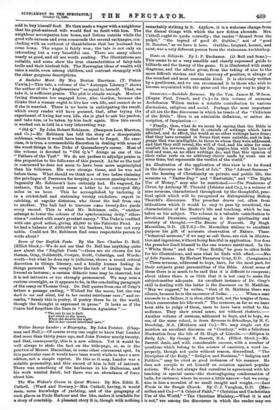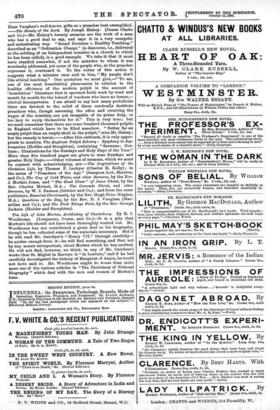SERMONS.—Rochdale Sermons. By the Ven. James M. Wilson. (Kegan Paul,
Trench, and Co.)—In this volume of sermons Archdeacon Wilson makes a notable contribution to various discussions, religious and social. Perhaps the most important of all are the fine discourses in which he treats of the " Criticism of the Bible." Here is an admirable definition, or rather de- scription, of Inspiration :-
" Finally, then, what do we mean by saying that the Bible is inspired ? We mean that it consists of writings which have affected, and do affect, the world as no other writings have done ; that they have revealed in forms that were suitable, and in lan- guage that was intelligible, to those to whom they were addressed, and that they still reveal, the will of God, and his aims for man, comfort his sorrows, guide his life, inspire him with the love of God and man, as no other writings do ; and that this opinion of their value rests on no arbitrary choice made by some one at some time, but represents the verdict of the world."
An illustration of the application of this view is to be found in the discourse on the " Book of Job." The " Advent Sermons " on the bearing of Christianity on private and public life, the sermons on " Easter-Day " and " Eastertide," and "The Right Use of Money," may also be mentioned.—The Tenderness of Christ, by Anthony W. Thorold (Isbister and Co.), is a volume of nine sermons, characterised throughout by the thoughtful, prac- tical spirit which will be recognised as distinguishing Bishop Thorold's discourses. The preacher draws out, often from intimations which it would be easy to pass by unnoticed, the characteristics of the Master's life and teaching, which he has taken as his subject. The volume is a valuable contribution to devotional literature, combining as it does spirituality and sobriety of thought. —The Daisies of Nazareth. By Hugh Macmillan, D.D. (R.T.S.)—Dr. Macmillan utilises to excellent purpose his gift of accurate observation of Nature. These "botanical sermons," if we may so call them, are rich in illustra- tion and ingenious, without being fanciful in application. Nor does the preacher limit himself to the one science mentioned. In the " White Stone" and the " Tear Bottle," he goes to other fields for his illustrations, and uses what he finds with effect. —Men of Like Passions. By Herbert Branston Gray, D.D. (Longmans.) —These sermons, addressed to boys, have, for the moat part, for their subjects great personalities of the Bible. About some of these there is so much to be said that it is difficult to compress ; about others there is so little that it is not easy to make the subject-matter adequate. An excellent instance of Dr. Gray's skill in dealing with the latter is the discourse on St. Matthias. " May we suggest," he writes, " that of St. Matthias there was silence, because he is the successor of Judas When a man succeeds to a failure, it is slow, silent toil, not the tongue of fame, which consecrates his life-work." The sermons, as far as we have been able to judge of them, seem to have been suited to the audience. They show sound sense, not without rhetoric.— Another volume of sermons, addressed to boys, and to boys, we see, of the same school, is Seven Sermons to Schoolboys, by H. C. Beeching, M.A. (Methuen and Co.)—We may single out for mention an excellent discourse on " Courtesy," with a felicitous illustration from the life of St. Hugh of Lincoln.—Religion in Daily Life. By George S. Barrett, B.A. (Elliot Stock.)—Mr. Barrett deals, and with considerable success, with a number of questions which belong to the science of casuistry, a word im- properly, though not quite without reason, discredited. " The Discipline of the Body," " Religion and Business," " Religion and Politics," may be cited as good instances of his manner. He does not scruple to set himself on occasion against popular notions. We do not always find ourselves in agreement with his teaching in special cases—the thoroughgoing condemnation of balls, for instance, where he seems a little narrow—but we recog- nise in him a moralist of no small insight and weight.--Last Words in the Temple Church. By C. J. Vaughan, D.D. (Mac- millan and Co.)—" A Crisis of Faith," " Christian and Unchristian Use of the World," " The Christian Ministry,—What it is and is not," are among the discourses in which the reader may see Dean Vaughan's well-known gifts as a preacher best exemplified. —The Beauty of the Lord. By Joseph Halsey. (James Clarke
and Co.)—Mr. Halsey's twenty sermons are the work of a man who has a good deal to say, and says it in a very energetic and unhesitating way. " Sound Doctrine v. Healthy Teaching," described as an " Ordination Charge " (a discourse, i.e., delivered at the settling of an Independent minister in a church to which he has been called), is a good example. We take it that it must
have startled somewhat, if not the minister to whom it was nominally addressed, yet some of the people who, as the preacher expresses it, overheard it. To the writer of this notice it suggests what a minister once said to him, "My people don't like ethical teaching." One quotation we must give,—" To me, one of the most humiliating phenomena in relation to the healthy efficiency of the modern pulpit is the amount of 'homiletical' literature that is spawned forth week by week and month by month for the behoof of teachers who have no lesson,— clerical incompetents. I am afraid to say how many periodicals there are devoted to the relief of those cerebrally destitute preachers who, though assuming the office and receiving the wages of the ministry, are yet incapable of its prime duty, or too lazy to equip themselves for it." This is very true ; but we must remember that there are some hundred thousand pulpits in England which have to be filled somehow. " Better far an empty pulpit than an empty skull in the pulpit," cries Mr. Halsey ; but the remedy is heroic.—After this outburst, it is only appro- priate to mention The Anglican Pulpit Library : Epiphany to Sep- tuagesima (Hodder and Stoughton), containing " Sermons ; Out- lines ; Illustrations for the Sundays and Holy Days of the Year." More than five hundred pages are given to nine Sundays and greater Holy Days.—Other volumes of sermons, which we must be content with acknowledging, are The Inspirations of the Christian Life, by Thomas F. Lockyer (Charles H. Kelly) ; in the series of "Preachers of the Age" (Sampson Low, Marston, and Co.), The Cup of Cold Water, and other Sermons, by the Rev. J. Morlais Jones, and "The Good Cheer" of Jesus Christ, by the Rev. Charles Moinet, M.A. ; The Comrade Christ, and other Sermons, by W. J. Dawson (Isbister and Co.); and from the same publishers, Essential Christianity, by the Rev. Hugh Price Hughes, M.A.; Questions of the Day, by the Rev. D. J. Vaughan (Mac- millan and Co.); and The First Things First, by the Rev. George Jackson (Hodder and Stoughton).



















































 Previous page
Previous page